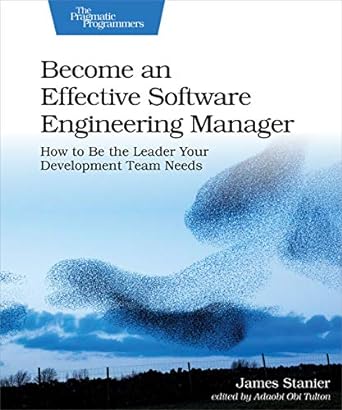Book review: Become an Effective Software Engineering Manager
This book was lent to me by Ania - a colleague of mine who has many years of experience in successfully running projects and must noticed my struggles in embracing the Delivery Manager role.
Initially, when I read the first few chapters I thought to myself: "Boring! I know all of it". Why would I say it? In many of the cases described by James I have experienced myself and felt like I won't learn anything new and reading it will be just a waste of time.
But then it hit me, this is exactly what makes this book so meaningful and down to earth. It was written by someone who went through all of it and his knowledge is based on experience rather than a compilation of good advice by a life coach who tries to teach you things they have no bloody idea about.
Luckily I haven't stopped reading until the last pages.
This book is a proof to me that we can there is always something new we can learn from others. I've discovered that getting a job as a PM or Delivery Manager is just the first step. Once you are there you are responsible not only for yourself or the project but for the people you get to manage how clients will perceive you and how it will impact their perception of the company you represent.
Cons
There are no real cons as such. Each chapter starts with either a situational scene in the office environment or a chat you have encountered in the past. I don't mind those as it set the stage for what matters will be discussed over the next few pages, however, in my opinion, it could be skipped.
Pros
There are plenty of practical examples, diagrams and tables that can easily be applied in your day-to-day job. Since my experience as a lead developer and someone who was exposed to direct contact with clients in the past, I found chapters that discussed 1 on 1 meetings, mentoring, diversity and inclusiveness as well as ideas on how to create a growing path not only for yourself but also for people you going to manage as very informative and interesting.
Work-life balance
The author dedicates keeping a work-life balance is important. Keeping in mind that we are unable to control everything and letting it go is far better than sleepless nights and feeling bad about things we don't have direct control over. It is so true and important on all levels of our professional careers but also private life. I guess, but I could be wrong, that the author, like many of us, must have experienced burnout or even had depression episodes. Again I can only confirm his words by nodding my head and signing under provided advice with both my hands.
The last chapters
"Startups" is very close to my heart - as it describes exactly the path I went through when transitioning from a seasoned developer into a management role. I have applied to several companies that had opened job vacancies before landing my first job as a manager at cob.brick - a company that helps startups validate ideas by building PoC/MVP as well as being a startup itself which strongly focuses on AI/ML and IoT.
The final chapter called "Crystal Ball" is on planning and envisioning one's future career to me is a real gem. It contains neat exercises that are about appreciating past achievements - and writing them down. By doing so you will notice how much you have achieved, who you met and who helped you - it's very recharging and sets you on the right track when looking into another 10 years ahead, with this feeling: "I did it once I can do it again" :). If you approach this chapter with an open mind it will help you strengthen your confidence in yourself.
To summarise
If you decide to make a shift sooner or later you'll be feeling down or questioning your choice - at least it happens to me in moments of high pressure or when things are not going in your favour. In most cases when taking a managing role it will mean taking a pay cut, and this also affects feeling strong and confident. But in moments like this, you have to remember and appreciate your achievements so far and trust in yourself that you can do it again (see "Crystal Ball" chapter). This book will serve as a reference point that you can read without following a particular order, just browse chapters that are relevant to you at a certain point of your career.
"Good management does not mean bureaucracy but it is a light touch and continued collaboration"
Post Scriptum
If at any given time you come to the conclusion that the manager role is not for you - this is also totally fine! There are no wrong decisions, just decisions. Do what brings you the most satisfaction and joy. All the time and effort put into trying out a new path won't be wasted, it will benefit you in years to come. So relax and enjoy the ride.
